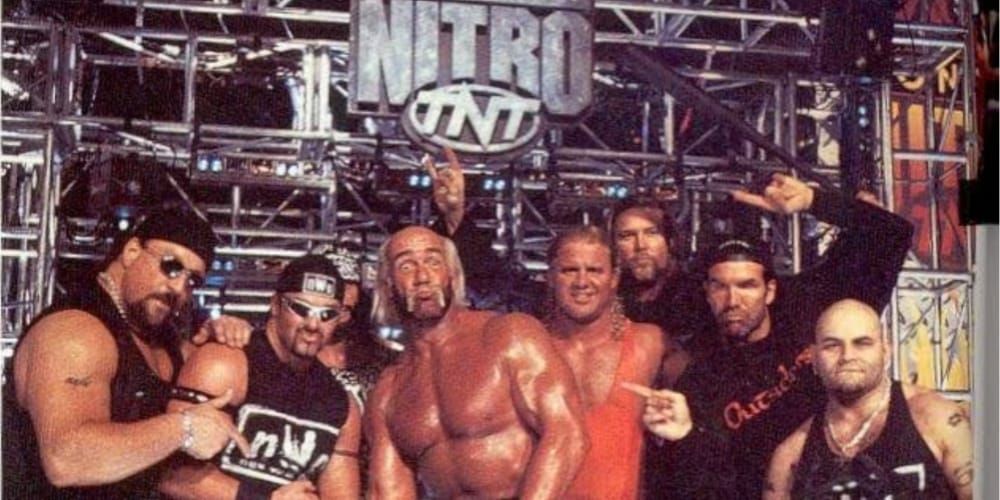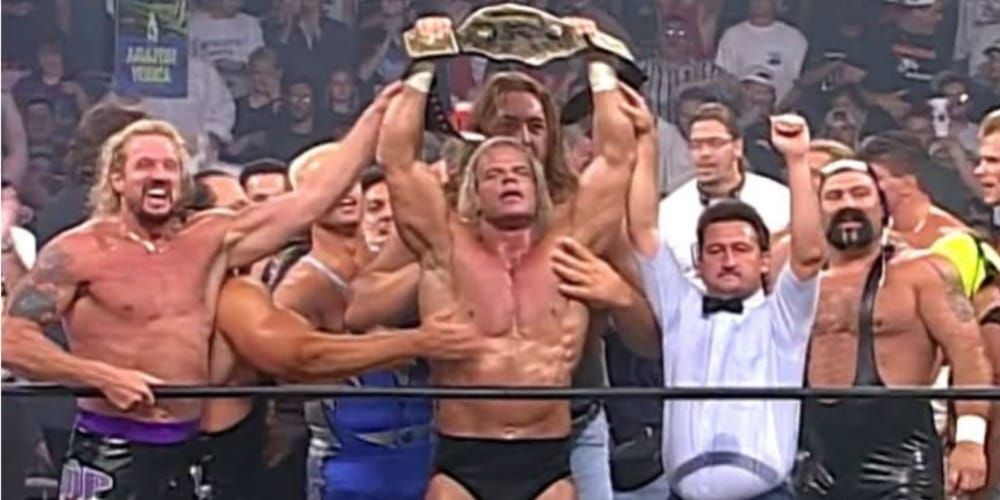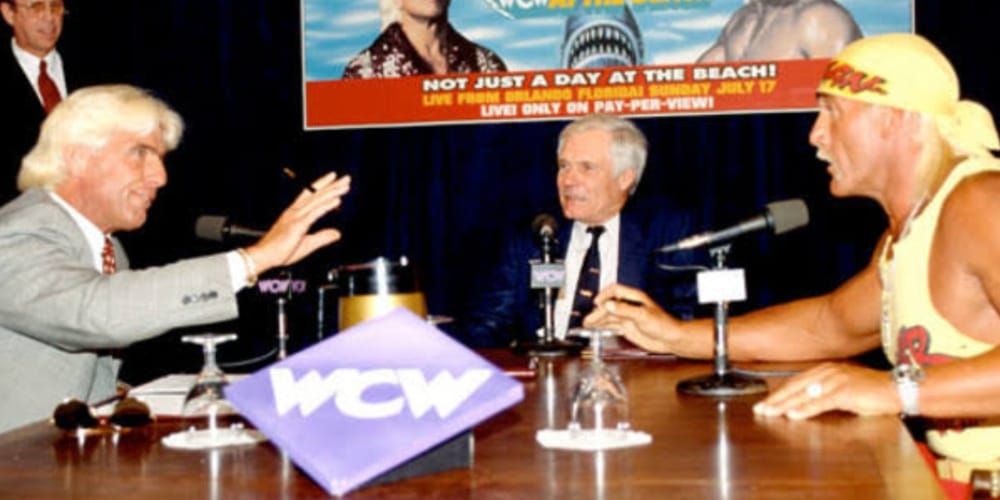Highlights
- WCW's financial backing from media mogul Ted Turner allowed them to compete on an unprecedented scale, offering wrestlers larger guaranteed contracts and more financial security.
- WCW strategically signed top talent like Hulk Hogan, Randy Savage, Kevin Nash, and Scott Hall, which bolstered the promotion's roster and drew in a loyal fan base, ultimately heightening WCW's popularity.
- WCW's rise to dominance during the Monday Night Wars was attributed to signing top talent, having an edgier product, and defeating WWE in the ratings for an impressive 83 consecutive weeks. However, backstage politics, questionable creative decisions, and WWE's shift to the Attitude Era eventually led to WCW's decline and ultimate sale to WWE in 2001.
The 1990s witnessed a transformative era in professional wrestling, and one company that shook the foundations of the wrestling world was World Championship Wrestling (WCW). Rising as a formidable contender to the WWE. WCW swiftly caught the attention of established wrestlers seeking new opportunities. Propelled by the financial might of media mogul Ted Turner, WCW enticed wrestling legends like Hulk Hogan, Randy Savage, Kevin Nash, Scott Hall, and many others to abandon their familiar WWE home. There were several reasons behind the magnetism of WCW contracts, offering wrestlers unprecedented appeal. And this led to a war between the two biggest wrestling promotions of the time.
WCW Had Financial Attraction And The Power Of Ted Turner's Backing
In the 1990s, the landscape of professional wrestling underwent a seismic shift, with WCW rising to become a major player in the industry. A significant factor in WCW's success and its ability to entice established wrestlers from WWE was the formidable financial backing provided by media mogul Ted Turner. As the founder of Turner Broadcasting System (TBS) and the owner of World Championship Wrestling, Turner wielded considerable resources that allowed WCW to compete on an unprecedented scale. Under Turner's patronage, WCW was able to offer wrestlers much more substantial financial incentives than what was typically available in WWE contracts at the time. This aggressive financial approach was instrumental in persuading several prominent stars to switch allegiances and join WCW's ranks. Wrestlers were drawn to the prospect of receiving larger guaranteed contracts, which offered them more financial security and lucrative opportunities.
One of the most significant signings for WCW was Hulk Hogan, arguably the most recognizable figure in professional wrestling history. Hogan's defection from WWE to WCW was a monumental shift that set the stage for WCW's ascendancy. The signing of Hogan was a strategic move by WCW to gain mainstream attention and appeal to a broader audience, ultimately bolstering their position as a worthy competitor to WWE. Following Hogan's lead, other top stars like "Macho Man" Randy Savage, Kevin Nash, and Scott Hall also made the leap to WCW, further solidifying the promotion's roster as a formidable force in the industry. The influx of these established talents brought with them a loyal fan base and heightened interest from the wrestling community, creating a snowball effect that propelled WCW's popularity to new heights. Moreover, Turner's financial backing enabled WCW to invest in top-notch production values, making their television shows and pay-per-view events visually appealing and captivating.
WCW Had A Lighter Work Schedule Than WWE And More Creative Control
In contrast to WWE's demanding tour schedule, which often required wrestlers to be on the road for over 300 days a year, WCW adopted a different approach. They introduced a touring schedule that allowed for more time off between shows, giving wrestlers much-needed rest and recovery. This lighter work schedule not only helped reduce the risk of burnout and injuries but also provided the wrestlers with more time to spend with their families and focus on personal interests outside of wrestling.
One of the most attractive aspects of WCW contracts was the level of creative control granted to top wrestlers, which was almost unheard of in the wrestling industry. The most prominent example of this was Hulk Hogan, whose contract with WCW reportedly gave him significant influence over his character and storyline development. This, in turn, contributed to WCW's edgier product, which appealed to the changing tastes of the audience during the 1990s.
WCW's Rise And Eventual Fall To WWE
In the 1990s, WCW experienced unprecedented success as they launched their Monday Nitro show, airing head-to-head with WWE's Monday Night Raw. This direct competition fueled the famous "Monday Night Wars," a fierce battle for television ratings and fan loyalty. WCW's rise to dominance during this period can be attributed to several key factors including signing top talent and having an edgier product. Between 1996 and 1998, WCW embarked on an impressive streak of 83 consecutive weeks of defeating WWE in the ratings. This accomplishment underscored the effectiveness of their product and the loyalty of their growing fanbase. WCW's momentum was undeniable, and its success reached its zenith during this period.
However, despite their initial triumphs, WCW's dominance was not without its challenges. Many factors contributed to the eventual decline and fall of the company. As WCW continued to gain popularity, backstage politics and power struggles intensified. Conflicting agendas and egos among wrestlers, creative personnel, and management led to a fragmented work environment. Personal rivalries and infighting sometimes took precedence over long-term planning and the greater good of the company. While WCW enjoyed success with its edgy product, it also made some questionable creative decisions that turned away fans. Long-term storytelling and character development were sometimes sacrificed for short-term shock value.
As the Monday Night Wars intensified, WWE responded with their own edgier product known as the Attitude Era. The Attitude Era featured compelling storylines, risqué content, and a more adult-oriented approach that resonated with the changing tastes of the audience. This shift in WWE's product presented a direct challenge to WCW's dominance and eroded their ratings lead. In 2001, after a series of financial losses and management troubles, WCW's parent company, Turner Broadcasting System, decided to sell the wrestling promotion to WWE.






0 Comments